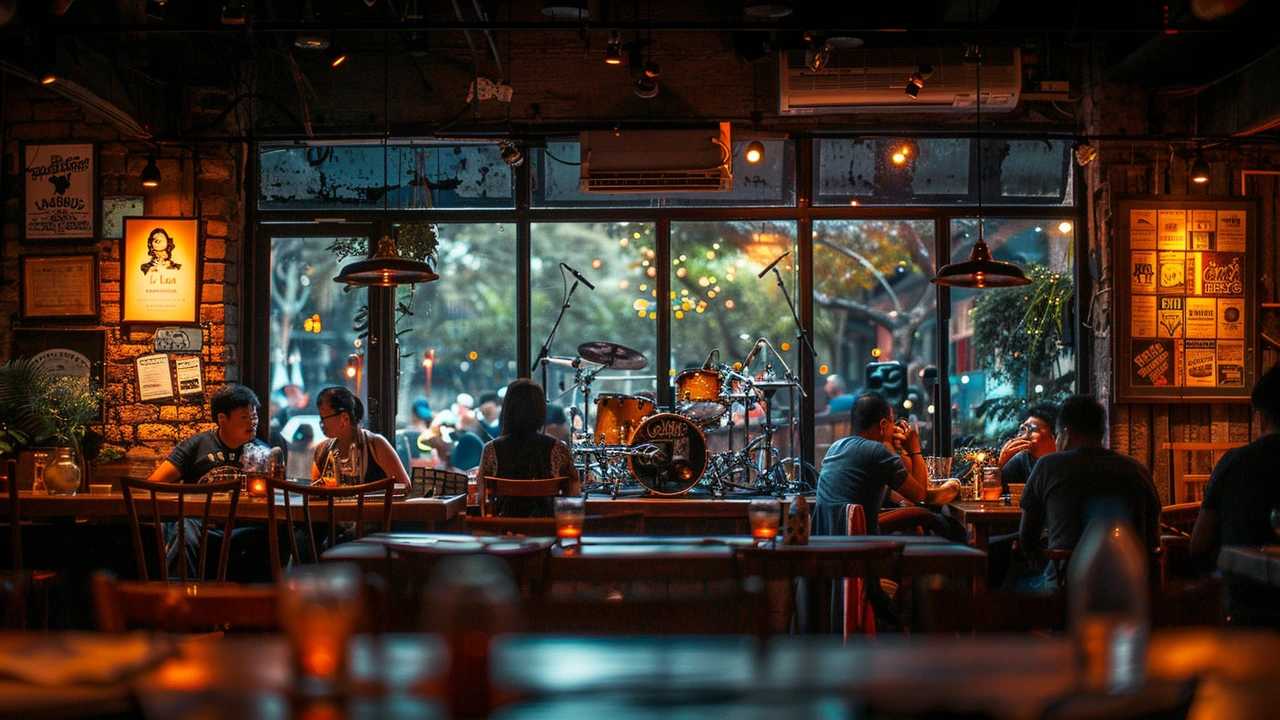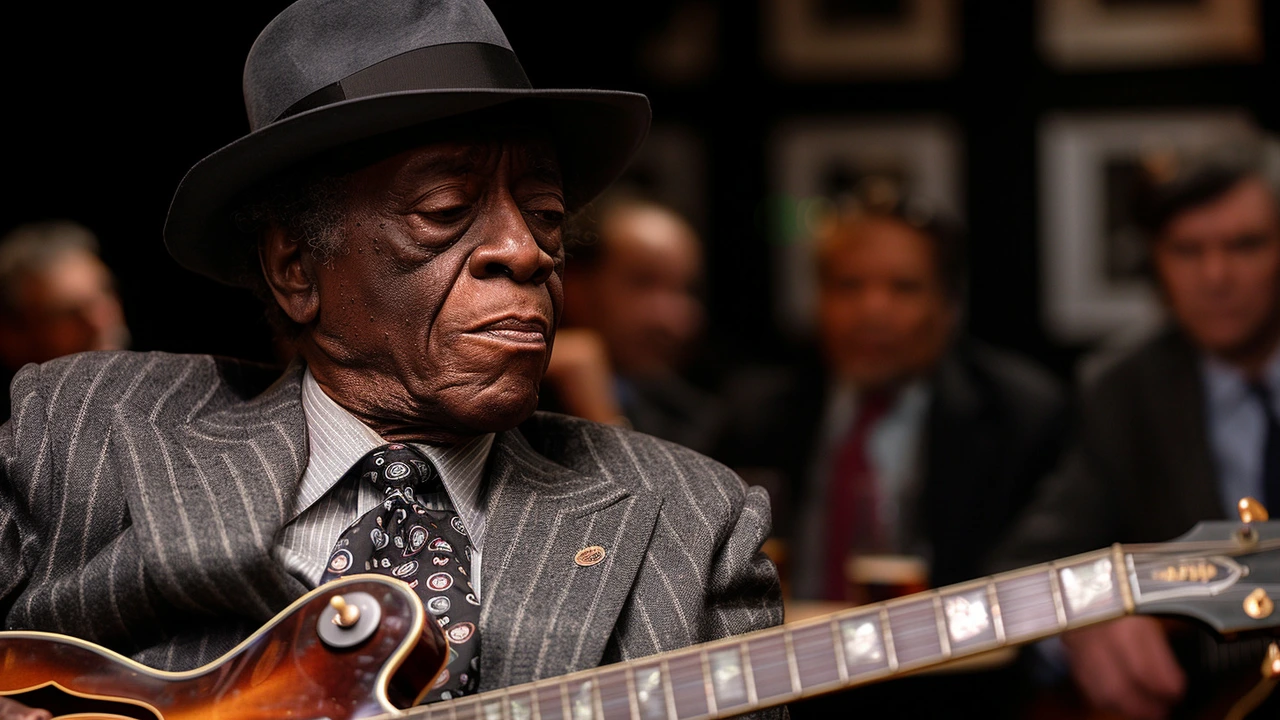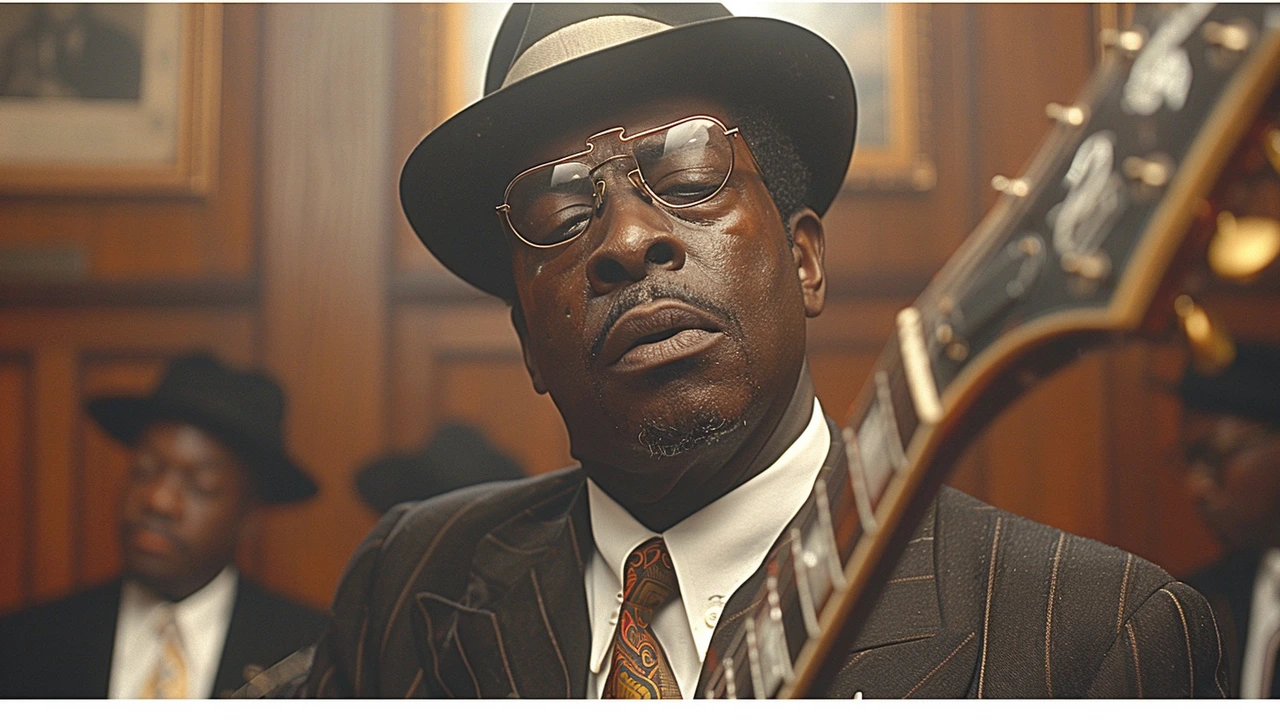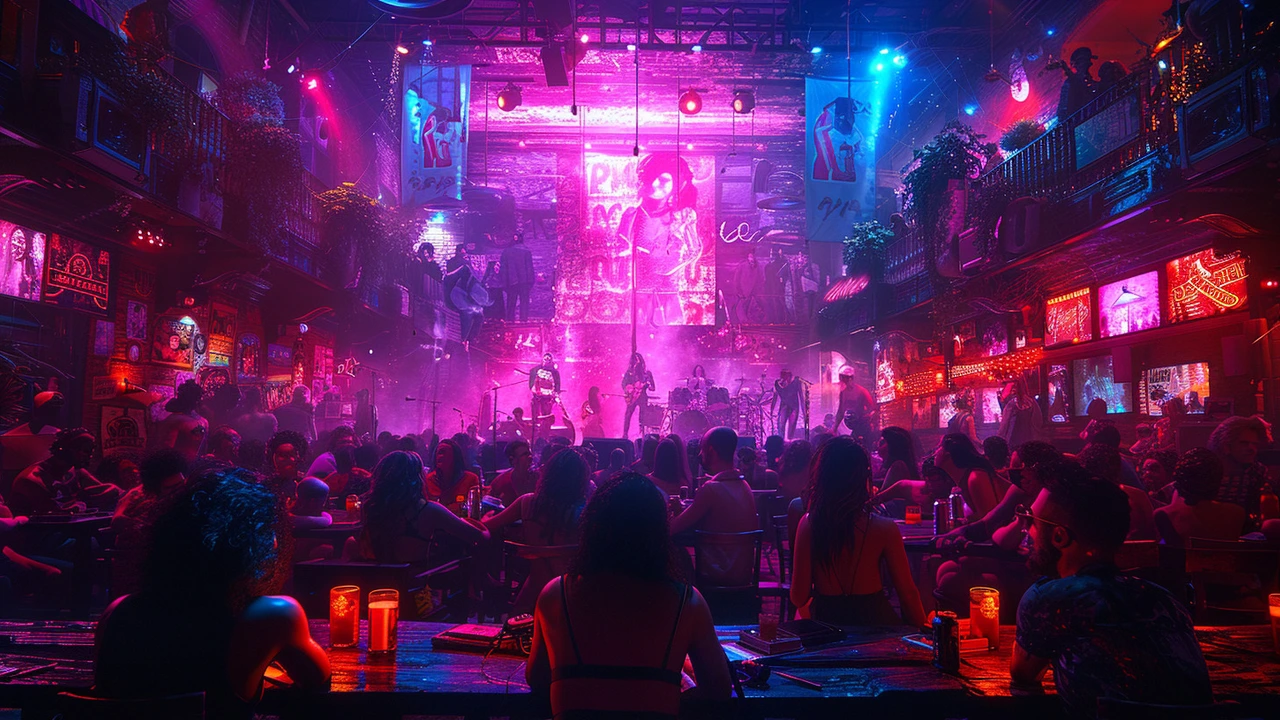Blues music is more than just a genre; it's a deeply ingrained part of American cultural heritage. Its soulful tunes and heartfelt lyrics have resonated through generations, directly influencing many modern music styles.
The origins of Blues can be traced back to the African American communities in the Deep South during the late 19th century. Born out of the trials and tribulations of hardship, the Blues tells a story of resilience and deep emotional expression.
From pioneers like W.C. Handy and Robert Johnson to modern legends like B.B. King and Muddy Waters, Blues music has evolved while retaining its core essence. These artists not only shaped the genre but also inspired countless others, creating the bedrock for genres like rock and roll, jazz, and even hip-hop.
But the influence of Blues goes beyond music; it has left an indelible mark on American culture and identity. Its themes of struggle, love, and survival are universally relatable, providing a voice for the voiceless.
Today, you can experience the raw, authentic sounds of Blues in cities like Chicago and New Orleans, where it all began. Visiting these places, attending live performances, and even exploring iconic Blues venues offers a glimpse into the rich history and ongoing legacy of this timeless genre.
Origins and Evolution
The origins of Blues music can be traced back to the late 19th century in the Deep South of the United States, where African American communities, predominantly composed of former slaves, resided. Life was grueling, and they used music as a means of expressing sorrow, hope, and faith. The field hollers, work songs, spirituals, and chants served as the building blocks for the Blues, each capturing different facets of their daily struggles and emotions.
Deep in the Mississippi Delta, a region recognized as the cradle of the Blues, the sound began to take shape. Using simple instruments like the guitar, harmonica, and even makeshift instruments, these pioneering musicians crafted a raw and emotional sound that resonated through the fields and streets. Pioneers like Charley Patton, known as the 'Father of the Delta Blues,' began to sculpt the early form of Blues music, embedding it with his distinctive, haunting voice and rhythmic guitar playing.
An interesting part of this evolution was the role of traveling musicians. These itinerant performers spread the Blues across various regions, adapting their music to reflect local influences and, in the process, diversifying the genre. It was during one of these travels that W.C. Handy, often called the 'Father of the Blues,' discovered the genre and helped popularize it by transcribing and publishing Blues songs. His compositions like 'Memphis Blues' and 'St. Louis Blues' brought the music from the fields to the mainstream, capturing a wider audience.
The Great Migration, a mass movement of African Americans from the rural South to urban areas in the North between 1916 and 1970, played a pivotal role in the spread and evolution of Blues music. Cities like Chicago and Detroit became vibrant hubs where Blues transformed, incorporating electric instruments and evolving into what is now known as the Chicago Blues. Artists like Muddy Waters and Howlin' Wolf were seminal in this electrification, bringing a new energy and intensity to the music. This urban Blues echoed through the packed clubs, forging a new identity while staying true to its roots.
Throughout its evolution, Blues music has maintained its essence–a profound narrative woven with pain, love, and survival. Its simplicity, yet depth, has allowed it to adapt and influence other genres significantly. Rock and roll, jazz, R&B, and even hip-hop owe a great debt to the Blues.
Keith Richards of The Rolling Stones once said, 'If you don't know the blues... there's no point in picking up a guitar and playing rock and roll or any other form of popular music.'This quote encapsulates how the Blues laid the groundwork for contemporary music, underscoring its timeless relevance.

Influential Artists
When it comes to Blues music, the genre has been blessed with numerous influential artists who have left indelible marks on its history. The stories and legacies of these musicians are not just tales of musical prowess but also narratives of resilience and innovation. One of the earliest figures to gain recognition is W.C. Handy. Often referred to as the 'Father of the Blues,' Handy's compositions like 'St. Louis Blues' brought the genre to the mainstream, giving it a broader audience.
Next, there’s Robert Johnson, a name that has become almost mythical in the annals of Blues history. His life was embroiled in tales of Faustian bargains, and his virtuosity on the guitar set new standards. Songs like 'Cross Road Blues' have become emblematic of the Delta Blues style. Johnson's influence is so pervasive that even rock legends like Eric Clapton have cited him as a crucial inspiration.
Muddy Waters, born McKinley Morganfield, brought the Delta Blues to the urban landscape, particularly in Chicago. His electrified version of the Blues transformed the genre and laid the groundwork for rock and roll. With hits such as 'Hoochie Coochie Man' and 'Mannish Boy,' Waters' commanding stage presence and deep voice captivated audiences worldwide. He once famously said, "The Blues had a baby, and they named it rock and roll," encapsulating his role in bridging genres.
Then there’s B.B. King, whose emotive guitar playing and distinctive voice have made him an enduring figure in music history. Known for hits like 'The Thrill Is Gone,' King’s expressive bending and vibrato techniques have influenced countless guitarists across various genres. His famous guitar, Lucille, became almost as iconic as the man himself.
Etta James, one of the few female voices to gain widespread acclaim in the Blues scene, broke barriers with her powerful performances. Songs like 'At Last' showcased her incredible vocal range and emotional depth, helping to pave the way for future generations of female Blues and soul singers.
Another noteworthy figure is Howlin' Wolf, whose booming voice and raw energy set him apart. Tracks like 'Smokestack Lightnin’' and 'Spoonful' have become staples in Blues music. His physical stature and commanding presence made him a spectacle to watch, and his recordings are still revered by Blues enthusiasts today.
"Blues is easy to play, but hard to feel," said Jimi Hendrix, capturing the essence of what makes Blues musicians so special. Their ability to convey deep emotion through their music is what separates the truly great from the merely good.
Together, these artists didn’t just shape the genre; they elevated it, ensuring that Blues music would influence generations to come. Each brought something unique to the table, whether it was a new style of playing, a powerful stage presence, or groundbreaking recordings. Their contributions have carved a permanent place for Blues in the heart of American music.

Cultural Impact
Blues music has woven itself into the very fabric of American culture. Its influence stretches beyond just the sounds and rhythms; it embodies the struggles, dreams, and spirit of a people whose voices might have otherwise gone unheard. Emerging in the late 19th and early 20th centuries, the Blues provided an outlet for African American sharecroppers and laborers in the post-Reconstruction South to express their pains and joys.
The legacy of Blues music is unmistakable in numerous genres that followed, from rock and roll to jazz and hip-hop. Artists such as Elvis Presley and the Rolling Stones have cited Blues musicians as their primary influences, revealing how deeply the genre has shaped modern music. The emotional depth found in the Blues, characterized by its raw and heartfelt lyrics, has resonated with countless people across generations.
Beyond the realm of music, Blues has also made significant contributions to American literature and cinema. Writers like Langston Hughes drew inspiration from the rhythms and themes of Blues, crafting poetry that echoed its sentiment and style. Similarly, movies like “Cadillac Records” have depicted the lives of prominent Blues musicians, introducing new audiences to the rich history of the genre.
Blues music has a unique ability to address universal themes of hardship, resilience, and hope, which makes it evergreen and relevant across different eras. The genre’s authenticity captures a genuine human experience, reflecting the highs and lows of life with an honesty that many genres strive to achieve. This authenticity is part of what makes Blues timeless, resonating with people all over the world even today.
Interestingly, Blues has also had a profound impact on civil rights movements. During the 1960s, Blues and other African American musical styles played a role in fostering unity and spreading messages of freedom and equality. The music became a vehicle for social change, delivering powerful messages in a way that speeches and marches often could not. As B.B. King once said, "Blues is a tonic for whatever ails you. I could play the Blues and then not be blue anymore."
The enduring appeal of Blues music is evident in its continued celebration through festivals, awards, and museum exhibits. Cities like Chicago and Memphis honor their Blues heritage with dedicated museums and annual events that attract visitors from around the world. These celebrations not only preserve the history of Blues but also allow new generations to experience its profound impact.
Through its powerful storytelling and soul-stirring melodies, Blues music continues to inspire and shape the cultural landscape of America. Whether you’re listening to a classic Robert Johnson track or a contemporary Blues artist, the essence of the genre speaks to a shared human experience, making it an indelible part of America's cultural heritage.

Experiencing the Blues Today
Diving into the modern world of Blues music offers an enchanting journey through its rich, soulful landscape. To experience Blues today, the first stop is undeniably the heartland cities where it was born and bred. Chicago and New Orleans serve as modern-day Meccas for Blues enthusiasts. These cities, steeped in history, resonate with the sounds of legendary artists echoing through their streets and venues.
In Chicago, the Blues runs deep through venues like Buddy Guy’s Legends, where live performances capture the essence of the Blues. Buddy Guy himself, a revered figure in the Blues world, often graces his club with heartfelt performances. The city's annual Chicago Blues Festival is a testament to the genre's enduring popularity, attracting thousands of fans and featuring both legendary musicians and emerging talents.
New Orleans, with its vibrant musical culture, offers a different flavor of the Blues. The historic French Quarter is alive with music, where clubs and bars host live Blues performances nightly. The New Orleans Jazz & Heritage Festival is another highlight, blending Blues with jazz and other genres in a celebration of the city’s musical heritage. Exploring the streets of New Orleans, you’re likely to hear Blues riffs mingling with the jazz brass, creating a unique soundscape.
For those looking to immerse themselves even further, visiting the Mississippi Delta, often referred to as the birthplace of the Blues, provides a profound connection to the genre's roots. Museums like the Delta Blues Museum in Clarksdale offer fascinating insights into the lives and careers of Blues pioneers. Here, you can trace the steps of greats like Robert Johnson and Muddy Waters.
While these cities are pivotal, the Blues’ influence pervades many parts of the United States and beyond. Blues festivals across the country, from the King Biscuit Blues Festival in Arkansas to the Waterfront Blues Festival in Portland, keep the genre alive and thriving. Each of these festivals showcases diverse artists and styles, allowing attendees to experience the rich, evolving tapestry of Blues music.
For those unable to travel, engaging with the Blues is still accessible through various media. Streaming services host vast collections of Blues tracks and albums, making it easier than ever to explore the genre from the comfort of your home. Documentaries and films, such as "The Blues" series produced by Martin Scorsese, provide compelling narratives and performances that bring the Blues to life.
The experience is not complete without live music. Many local bars and clubs, even outside the traditional Blues strongholds, offer live Blues nights, often featuring talented local musicians. These intimate settings can provide an authentic experience that connects directly with the heart of the Blues.
As the Blues continues to evolve, it retains its core – the deeply emotional storytelling through music. Experiencing it today means not just listening to the notes, but feeling the stories they tell. Whether it's through live performances, festivals, or films, the Blues remains a powerful and moving part of American musical heritage, inviting each listener to become part of its ongoing story.

